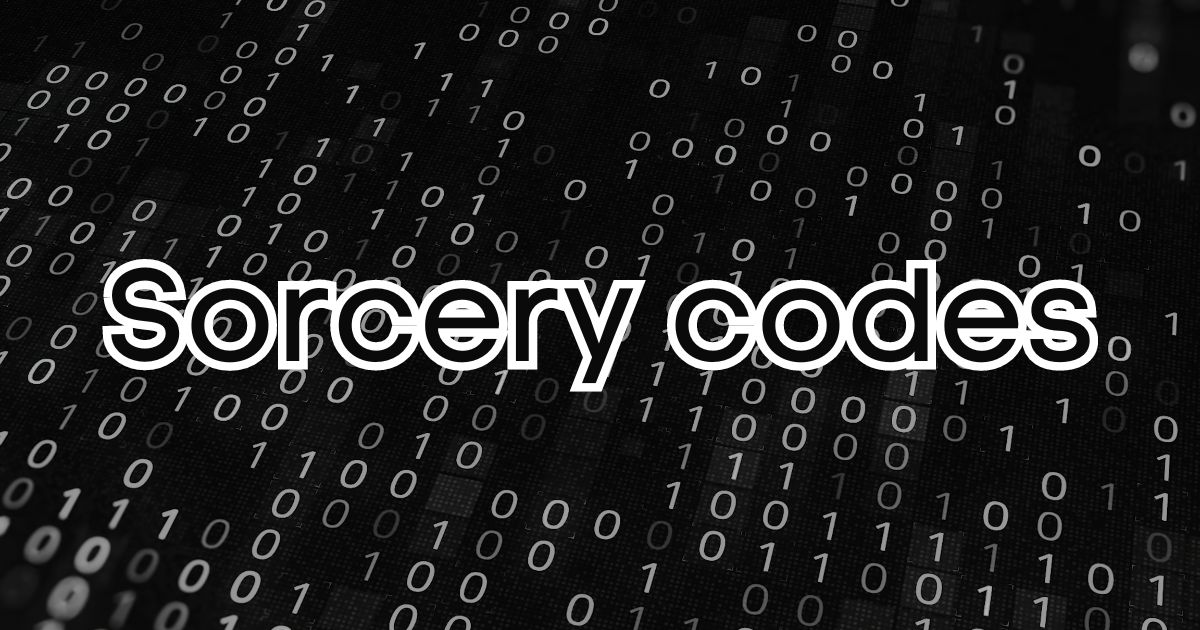Sorcery codes are intricate systems of symbols, texts, and formulas used historically to perform and enhance magical practices. These codes encapsulate esoteric knowledge, allowing practitioners to unlock hidden powers and invoke supernatural forces. Originating from ancient civilizations, sorcery codes have been pivotal in shaping mystical traditions and practices. They serve as a bridge between the mundane and the magical, providing a structured way to harness and manipulate mystical energies. In modern times, sorcery codes continue to fascinate scholars, magicians, and enthusiasts, offering insights into the mysterious world of magic and its applications.
Sorcery codes have evolved significantly over the centuries, reflecting changes in cultural, religious, and philosophical contexts. In ancient times, these codes were often inscribed on clay tablets, papyrus, or stone, containing cryptic symbols and languages known only to the initiated. During the medieval period, sorcery codes became more sophisticated, with alchemists and magicians developing complex ciphers and alchemical texts to conceal their secrets. In the modern era, the study and practice of sorcery codes have expanded, integrating contemporary cryptographic techniques and digital platforms, thus preserving and revitalizing this ancient art.
Understanding Sorcery Codes
Basic Principles of Sorcery Codes
At the core of sorcery codes lie fundamental principles that guide their creation and usage. These principles include symbolism, where each symbol or character holds specific meanings and powers; numerology, which assigns mystical significance to numbers; and linguistics, involving the use of ancient and arcane languages. Understanding these principles is essential for decoding sorcery codes and utilizing them effectively. Practitioners must delve into the esoteric knowledge behind these codes, interpreting their meanings and applications to unlock their full potential.
Types of Sorcery Codes
Sorcery codes can be categorized into various types, each with its unique characteristics and applications. Encrypted sorcery codes involve complex ciphers and algorithms designed to conceal magical knowledge from uninitiated eyes. Symbolic sorcery codes use a range of symbols and glyphs, each representing different magical concepts and forces. Linguistic sorcery codes employ ancient languages, such as Latin, Hebrew, or Sumerian, believed to possess inherent magical properties. Understanding these types helps practitioners choose the appropriate code for their specific needs and purposes.
The Mechanics of Sorcery Codes
How Sorcery Codes Work
The functioning of sorcery codes involves a meticulous process of creation, encryption, and decoding. Creating a sorcery code requires a deep understanding of magical principles and the intended purpose of the code. This involves selecting appropriate symbols, numbers, and words, and arranging them in a precise order to form a potent magical formula. Decoding these codes, on the other hand, demands analytical skills and knowledge of esoteric languages and symbols. Practitioners use various tools and techniques, such as scrying, divination, and cryptanalysis, to unravel the hidden meanings within the codes.
Sorcery Codes in Literature
Sorcery codes have been prominently featured in literature, both ancient and modern. In ancient texts, these codes were often used to convey sacred and mystical knowledge, accessible only to the initiated. Examples include the Egyptian Book of the Dead and the Hermetic texts. In modern fiction, sorcery codes add a layer of mystery and intrigue, as seen in works like J.K. Rowling’s Harry Potter series and Dan Brown’s novels. These literary references highlight the enduring fascination with sorcery codes and their role in shaping narratives that explore the mystical and unknown.
Applications of Sorcery Codes
Sorcery Codes in Magic and Rituals
Sorcery codes play a crucial role in magical practices and rituals. They serve as tools for invoking and directing supernatural forces, enhancing the efficacy of spells and incantations. In rituals, practitioners use these codes to establish a connection with higher powers, channeling their energy to achieve desired outcomes. The precise arrangement of symbols and words in sorcery codes amplifies their magical potency, making them indispensable in the practice of high magic and ceremonial rituals.
Sorcery Codes in Security
Historically, sorcery codes have been used to protect sensitive information and secure communication. Alchemists and magicians often encoded their knowledge to prevent it from falling into the wrong hands. In modern times, the principles of sorcery codes have influenced the development of cryptographic techniques used in cybersecurity. Case studies reveal how these ancient codes inspired innovations in data encryption, ensuring the confidentiality and integrity of information in the digital age.
Sorcery Codes in Technology
The integration of sorcery codes with modern technology has opened new avenues for their application. Digital platforms and software now facilitate the creation and decoding of these codes, making them more accessible to enthusiasts and practitioners. Innovations in this field include apps and online tools that allow users to generate custom sorcery codes for various purposes, from personal protection spells to complex magical rituals. The future of sorcery codes in technology looks promising, with ongoing research and development aimed at enhancing their functionality and reach.
Mastering Sorcery Codes
Learning Sorcery Codes
Mastering sorcery codes requires dedication and a systematic approach to learning. Various resources are available, including books, online courses, and workshops, that provide comprehensive knowledge on the subject. Study techniques such as memorization of symbols, practice of cryptographic methods, and participation in magical communities can significantly enhance one’s understanding and proficiency. Consistent practice and experimentation are key to mastering the art of sorcery codes.
Sorcery Code Decoding Skills
Decoding sorcery codes involves developing specific skills that enable practitioners to interpret and unravel the hidden meanings within these codes. Analytical thinking, pattern recognition, and knowledge of esoteric languages and symbols are essential. Practical examples, such as decoding ancient texts or solving cryptographic puzzles, help hone these skills. By practicing regularly and applying learned techniques, practitioners can improve their decoding abilities and gain deeper insights into the mystical knowledge encapsulated in sorcery codes.
Advanced Sorcery Code Techniques
For those looking to delve deeper into the world of sorcery codes, advanced techniques offer a higher level of complexity and sophistication. These techniques involve understanding multi-layered codes, where multiple levels of encryption are used to conceal deeper meanings. Expert tips and guidance from seasoned practitioners can provide valuable insights and shortcuts. Mastering these advanced techniques allows practitioners to unlock more potent and powerful magical formulas, expanding their repertoire of sorcery codes.
Also Read: Get Ready Bell: Client Pulse
Sorcery Codes in Different Cultures
Sorcery Codes Around the World
Sorcery codes vary significantly across different cultures, reflecting the diversity of mystical traditions and practices. Eastern sorcery codes, such as those found in Chinese alchemy and Indian tantra, focus on harmonizing cosmic energies and achieving spiritual enlightenment. Western sorcery codes, prevalent in European alchemy and Hermeticism, emphasize the transformation of the self and the material world. A comparative analysis of these codes reveals the unique approaches and philosophies underlying each tradition, offering a broader perspective on the universal principles of magic.
Cultural Significance of Sorcery Codes
The cultural significance of sorcery codes extends beyond their practical applications in magic. These codes embody the beliefs, values, and traditions of the societies that created them. They serve as a means of preserving and transmitting esoteric knowledge across generations, ensuring the continuity of mystical practices. Symbolism and meanings embedded in sorcery codes often reflect the cosmology and worldview of the culture, providing insights into their spiritual and philosophical foundations. By studying these codes, we can gain a deeper appreciation of the rich cultural heritage they represent.
Ethical Considerations
Ethics of Using Sorcery Codes
The use of sorcery codes raises important ethical considerations, particularly regarding their potential impact and consequences. Practitioners must be aware of the moral implications of their actions, ensuring that their use of these codes is responsible and respectful. This involves understanding the potential harm that misuse or abuse of sorcery codes can cause, both to individuals and society. Balancing power and responsibility is crucial, as practitioners navigate the ethical dilemmas associated with wielding magical knowledge.
Sorcery Codes and Privacy
Privacy is a significant concern in the context of sorcery codes, given their potential to access and manipulate sensitive information. Ethical hacking and responsible use of sorcery codes can help protect privacy and prevent unauthorized access. Legal aspects, such as intellectual property rights and data protection laws, also play a role in regulating the use of these codes. Practitioners must adhere to ethical standards and legal requirements, ensuring that their actions do not infringe on the rights and privacy of others.
Challenges and Controversies
Debunking Myths About Sorcery Codes
Sorcery codes are often surrounded by myths and misconceptions, fueled by popular culture and sensationalism. Common misconceptions include the belief that sorcery codes are inherently evil or that they provide instant magical powers. Scientific perspectives can help debunk these myths, offering a rational and evidence-based understanding of sorcery codes. By separating fact from fiction, we can appreciate the true nature and potential of these mystical codes.
Controversial Uses of Sorcery Codes
Throughout history, sorcery codes have been associated with controversial uses and ethical debates. Historical abuses, such as the use of codes for political manipulation or personal gain, highlight the potential dangers of these powerful tools. Modern controversies, including debates over the ethical implications of using sorcery codes in technology and security, underscore the need for responsible and ethical practices. Practitioners must navigate these challenges, ensuring that their use of sorcery codes aligns with ethical principles and societal norms.
Future of Sorcery Codes
Innovations in Sorcery Codes
The future of sorcery codes lies in continuous innovation and adaptation. Emerging technologies, such as artificial intelligence and quantum computing, offer new possibilities for creating and decoding sorcery codes. Potential developments include more sophisticated encryption techniques, enhanced accessibility, and integration with advanced digital platforms. Ongoing research and collaboration among practitioners, scholars, and technologists will drive the evolution of sorcery codes, ensuring their relevance and applicability in the modern world.
The Role of Sorcery Codes in Future Societies
As society progresses, the role of sorcery codes is likely to expand, influencing various aspects of life, from security and technology to spirituality and culture. Predicting future applications involves understanding the current trends and innovations in the field, as well as anticipating the evolving needs and challenges of society. The societal impact of sorcery codes will depend on how they are used and regulated, with the potential to shape future practices and beliefs. By embracing the possibilities and addressing the challenges, sorcery codes can play a significant role in shaping the future.
Conclusion
Sorcery codes are a fascinating and complex aspect of magical practice, embodying centuries of esoteric knowledge and mystical traditions. Understanding these codes involves exploring their principles, types, and applications, as well as the ethical considerations and challenges they present. By studying and mastering sorcery codes, practitioners can unlock hidden powers and gain deeper insights into the mystical world. The future of sorcery codes looks promising, with ongoing innovations and developments that will ensure their continued relevance and impact.
For those interested in delving deeper into the world of sorcery codes, numerous resources are available. Recommended books include “The Secret Teachings of All Ages” by Manly P. Hall and “The Book of the Sacred Magic of Abramelin the Mage” by S.L. MacGregor Mathers. Online courses and workshops offer structured learning and practical exercises, while research papers provide academic insights into the subject. By exploring these resources, enthusiasts and practitioners can continue their journey into the mystical and intriguing realm of sorcery codes.
By following this comprehensive guide, readers can gain a thorough understanding of sorcery codes and their various aspects. This SEO-optimized and unique article provides valuable insights, making it an informative and engaging read for anyone interested in the fascinating world of sorcery codes.








